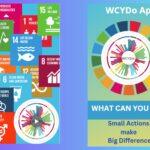Table of Contents
1. “What is the UN doing?“
2. “What are Governments doing?“
3. “What are Development Agencies doing?“
4. “What are Private Sector Corporations doing?“
5. “What are NGO’s & Charities doing?“
There is no Planet B!
What is the UN doing?
The United Nations (UN) mobilised and coordinated governments of its’ member countries, Global businesses and civil society over several years to discuss and agree 17 Goals to transform the World. In 2015, the 193 UN Member Countries adopted the 2030 Agenda for Sustainable Development and its’ 17 Sustainable Development Goals (“SDGs“).
In 2016, the Paris Agreement on Climate Change came into effect and its’ provisions are already incorporated into the SDGs. Relevant UN agencies are now coordinating and promoting their adoption and implementation at International and National level. They are also mobilising the media worldwide to inform and educate the general public about the SDGs and about this unprecedented opportunity to help create a Better World.
The UN has also established a High-Level Political Forum (HLPF) where senior government officials from UN member countries can meet annually to discuss progress on achieving SDG targets. Every 4th year delegates to HLPF are the Heads of State and their last meeting was in 2019. The UN continues to mobilise its various agencies to support and promote the SDGs
What are Governments doing?
At National levels, all UN member countries have agreed to promote and support SDGs and to tailor their policies to reflect the “SDGs“. Some have established or adapted governmental structures to implement their SDG responses more effectively and are now systematically implementing SDG Action Plans. During 2016, 22 countries reported their progress via voluntary national reports (VNRs) and by 2019, 47 countries were reporting their progress in such reports. International governmental organisations such as OECD (whose 36 members are the richer, more developed Countries) now periodically monitor and compare progress on SDGs.
Some countries allocated responsibilities for particular SDGs to relevant Ministries, some established a special Commission to coordinate SDGs implementation while others have included SDGs into National Strategies. The international umbrella member organisations for Local Governments have also identified specific actions that can be taken at Local Government level and many Cities around the world are now beginning to address SDG issues within their areas of responsibility.
Sadly despite many promises of funding and action, many governments continue to be slow in fulfilling those promises.We would encourage individuals to write to National and Local Politicians asking what is happening re SDGs in their jurisdictions and to prod them into taking action to deliver on the promises made by their National leaders at the United Nations.
What are Development Agencies doing?
When the Millennium Development Goals (MDGs) were announced in 2000, the Development Agencies’ focus for the following 15 years was concentrated solely on the MDGs. Now that the “SDGs” are agreed, they are focusing on these. Future aid and development activities are likely to be assessed in relation to their contribution towards the SDGs which will help Developing Countries address their problems.
SDGs are likely to be the focus of aid and development assistance until 2030
Unfortunately this focus alone is unlikely to be enough – US$Trillions – are need annually around the World if the SDGs are to be achieved. Politicians need to be prodded to make funding available and monitored to ensure that the promises made at the United Nations are fulfilled.
What are Private Sector Corporations doing?
Around 9000 businesses and 3000 other organisations are members of the United Nations’ (UN) Global Compact. Their Chief Executive Officers are committed to implementing universal sustainability principles and supporting the UN Goals.
There is, undoubtedly, a growing momentum across many large private-sector corporations addressing “SDGs” as part of their Social Corporate Responsibility (CSR) obligations or what is now often called Company Sustainability Reports (CSR).
CSR Definition: “A CSR, corporate social responsibility or sustainability report is a periodical (usually annual) report published by companies with the goal of sharing their corporate social responsibility actions and results. The report synthesizes and makes public the information organizations decide to communicate regarding their commitments and actions in social and environmental areas. By doing so, organisations let stakeholders (i.e., all parties interested in their activities) aware of how they are integrating the principles of sustainable development into their everyday operations.” (Source: “YouMatterWorld“)
Company Chief Executives should be contacted and encouraged to address SDGs so that they can see and benefit from public support arising from such action.
What are NGOs & Charities doing?
A number of Charities support all or subgroups of the “SDGs” while others take a particular interest in a specific SDG. In addition, a few Charities, NGOs and social enterprises such as us at What Can you Do (Earth) are trying to mobilise individuals to take action.
There is a growing body of concerned citizens who want to do something!
Individuals now have many options for getting engaged depending upon their particular areas of interest. Some of the main and most active SDG-related charities are shown below and we encourage your support by volunteering and/or donations:
– stophunger.org
– globalcitizen.org
– empower.org.au
– water.org
– betterenergy.org
– one.org
– oceanconservancy.org
– oceana.org
– conservation.org
– namati.org
Donations in support of “What Can You Do (Earth) CIC” are always welcome
“On our Donations Page“






